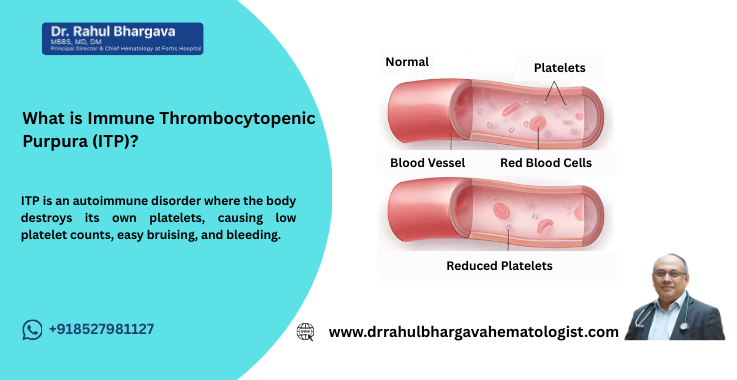Immune Thrombocytopenic Purpura (ITP)

Immune Thrombocytopenic Purpura (ITP) is a rare autoimmune disorder characterized by a low platelet count (thrombocytopenia) due to the destruction of platelets by the immune system. In ITP, the body's immune system mistakenly attacks and destroys its own platelets, which are crucial for blood clotting. This leads to an increased risk of bleeding and bruising. ITP can be classified into two types: acute ITP (which typically affects children) and chronic ITP (more common in adults).
Immune Thrombocytopenic Purpura (ITP)
Immune Thrombocytopenic Purpura (ITP) is a blood disorder characterized by an abnormally low platelet count, which can lead to easy bruising, excessive bleeding, and red or purple spots on the skin (purpura). Platelets play a crucial role in blood clotting, and a deficiency can result in significant bleeding issues. This autoimmune condition occurs when the body’s immune system mistakenly attacks and destroys its own platelets.
Dr. Rahul Bhargava, one of India’s leading haematologists, offers specialized treatment for ITP. With years of experience in managing blood disorders, Dr. Bhargava is recognized for delivering personalized care that improves patient outcomes.
Causes of ITP
The exact cause of ITP is often unclear, but several factors can contribute to its development. These include:
- Autoimmune Disorders: In ITP, the immune system targets platelets, marking them for destruction.
- Viral Infections: Conditions like HIV, hepatitis, or recent viral infections can trigger ITP.
- Medications: Certain drugs may trigger an immune response that affects platelet levels.
- Genetics: A family history of autoimmune disorders can increase the risk.
Types of ITP
ITP is classified into two main types:
- Acute ITP: Commonly seen in children, it often follows a viral infection and may resolve within six months without treatment.
- Chronic ITP: Predominantly affects adults and can last for more than six months, often requiring long-term management.
Symptoms of ITP
ITP symptoms can range from mild to severe. Some common signs include:
- Easy or excessive bruising
- Small red or purple spots on the skin (petechiae)
- Prolonged bleeding from cuts or injuries
- Frequent nosebleeds or gum bleeding
- Heavy menstrual flow
- Fatigue due to low platelet count
If you or a loved one experience these symptoms, it is crucial to seek medical advice promptly.
Diagnosis of ITP
Dr. Rahul Bhargava uses a comprehensive approach to diagnose ITP, ensuring accurate identification and effective treatment planning. Diagnostic methods include:
- Complete Blood Count (CBC): This test checks the number of platelets in the blood.
- Bone Marrow Examination: In some cases, a bone marrow biopsy may be required to rule out other conditions.
- Antibody Tests: To detect the presence of antibodies that attack platelets.
- Physical Examination and Medical History: Dr. Bhargava carefully assesses symptoms and reviews your medical history.
Treatment of ITP
Treatment for ITP varies depending on the severity of the condition and the patient’s individual needs. Dr. Bhargava offers tailored treatment plans which may include:
- Medications: Corticosteroids and immunoglobulin therapy to suppress the immune system’s attack on platelets.
- Platelet Transfusions: For patients experiencing severe bleeding, platelet transfusions may be required.
- Splenectomy: In some cases, the spleen (which plays a role in platelet destruction) may be surgically removed.
- Immunosuppressive Therapy: Medications to reduce immune system activity and platelet destruction.
Cost of Treatment and Stay in India
The cost of treating Immune Thrombocytopenic Purpura (ITP) in India is considerably lower compared to many Western countries, making it an attractive destination for medical care. The total cost of treatment, including consultations, medications, and hospital stays, varies depending on the severity of the condition and the specific treatment required. Here’s an overview of the costs:
-
Initial Consultation:
USD: $30 – $100
INR: ₹2,200 – ₹7,400 -
Blood Tests (CBC, Antibody Tests, etc.):
USD: $30 – $100
INR: ₹2,200 – ₹7,400 -
Medications (Corticosteroids, Immunoglobulin Therapy, etc.):
USD: $50 – $300 per month
INR: ₹3,700 – ₹22,200 per month -
Platelet Transfusions:
USD: $100 – $500 per session
INR: ₹7,400 – ₹37,000 per session -
Splenectomy (Surgical Removal of Spleen):
USD: $2,000 – $6,000
INR: ₹1,50,000 – ₹4,50,000 -
Hospital Stay (per night):
USD: $25 – $200
INR: ₹2,000 – ₹15,000 per night
India offers high-quality healthcare services at affordable prices, making it an excellent choice for those seeking treatment for ITP. The cost is significantly lower than in many other countries, while still ensuring access to world-class medical expertise and facilities.
Frequently Asked Questions
ITP flares can be triggered by infections, stress, or other autoimmune disorders. It is important to manage any underlying health issues to keep ITP under control.
While ITP may not be curable in all cases, it is manageable with the right treatment. Many patients experience remission or significantly improved platelet counts.
If left untreated, ITP can result in severe bleeding and complications. However, with appropriate treatment, most patients lead a normal life.